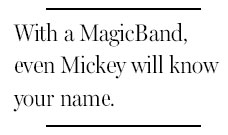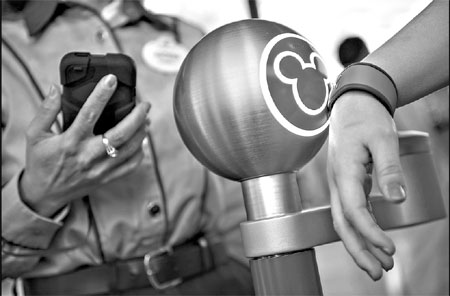A bracelet that will open the doors at Disney parks
Updated: 2013-01-20 07:59
By Brooks Baunes(The New York Times)
|
|||||||
|
Bands that collect personal data can help Disney sales at its theme parks. But the consumer-tracking devices are also raising privacy issues. Kent Phillips / Disney |

ORLANDO, Florida - Imagine visitors to Walt Disney World wearing rubber bracelets encoded with credit card information, snapping up corn dogs and Mickey Mouse ears with a tap of the wrist. Smartphone alerts would signal when it is time to ride Space Mountain without standing in line.
Fantasyland? Hardly.
In the coming months Disney plans to begin introducing a vacation management system called MyMagic+ that will drastically change the way Disney World visitors - some 30 million people a year - do just about everything.
The initiative is part of a broader effort, estimated by analysts to cost between $800 million and $1 billion to make visiting Disney parks more amenable to modern consumer behavior.
"If we can enhance the experience, more people will spend more of their leisure time with us," said Thomas O. Staggs, chairman of Disney Parks and Resorts.
The plan moves Disney deeper into the hotly debated terrain of personal data collection. The company already collects data to use in future sales campaigns, but parts of MyMagic+ will allow Disney to track guest behavior in minute detail.
Did you buy a balloon? What attractions did you ride? Did you shake Goofy's hand, but ignore Snow White?
Disney is aware of privacy concerns, especially regarding children. But the company has decided that it must weave new technology into its parks or risk becoming irrelevant, Mr. Staggs said. From a business perspective, he said, MyMagic+ could be "transformational."
Disney is not the first vacation company to use wristbands equipped with radio frequency identification, or RFID, chips. But Disney's global parks operation, which has an estimated 121.4 million admissions a year and generates $12.9 billion in revenue, is so huge that it can greatly influence consumer behavior.
"When Disney makes a move, it moves the culture," said Steve Brown, chief operating officer for Lo-Q, a British company that provides line management and ticketing systems for theme parks and zoos.
Disney World guests currently plod through entrance turnstiles, redeeming paper tickets, and then decide what to ride; food and merchandise are bought with cash or credit cards. People race to FastPass kiosks, which dispense a limited number of free line-skipping tickets. But gridlock quickly sets in and most people wait. And wait.
In contrast, MyMagic+ will allow users of a new Web site and app - called My Disney Experience - to preselect three FastPasses before they leave home for rides or preferred seating for parades, fireworks and character meet-and-greets. MagicBands will function as room key, park ticket, FastPass and credit card.
MagicBands can also be encoded with personal details. Now - if parents opt in - hidden sensors will read MagicBand data, providing information needed for a personalized greeting from the employee playing Cinderella: "Hi, Angie," the character might say without prompting. "I understand it's your birthday."
Guests who choose to use the MagicBand system will decide how much information to share.
Disney fan blogs offer a window into the likely debate.
"Although I know this type of technology is making its way into every facet of life, it still makes me feel a bit creeped out," wrote Jayne Townsley on StitchKingdom.com.
Pam Falcioni, another StitchKingdom user, had the opposite response. "I think it sounds awesome," she wrote. "Anyone worried about real' privacy wouldn't be wandering around a theme park full of security cameras."
Disney has 60,000 employees here and many must be retrained to use new technology.
But Mr. Staggs said Disney's board decided to move ahead after identifying multiple ways in which the initiative could expand profits.
"If Disney can drive more value from existing infrastructure by layering on technology, that is extremely powerful," said Mr. Brown of Lo-Q. "They can't just compete by building new rides; it's already a theme-park arms race out there."
The New York Times
(China Daily 01/20/2013 page10)
